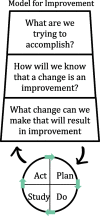Multidimensional assessment of infant, parent and staff outcomes during a family centered care enhancement project in a tertiary neonatal intensive care unit: study protocol of a longitudinal cohort study
- PMID: 37420180
- PMCID: PMC10326953
- DOI: 10.1186/s12887-023-04165-0
Multidimensional assessment of infant, parent and staff outcomes during a family centered care enhancement project in a tertiary neonatal intensive care unit: study protocol of a longitudinal cohort study
Abstract
Background: The therapeutic advances and progress in the care for preterm infants have enabled the regular survival of very immature infants. However, the high burden of lifelong sequelae following premature delivery constitutes an ongoing challenge. Regardless of premature delivery, parental mental health and a healthy parent-child relationship were identified as essential prerogatives for normal infant development. Family centered care (FCC) supports preterm infants and their families by respecting the particular developmental, social and emotional needs in the Neonatal Intensive Care Unit. Due to the large variations in concepts and goals of different FCC initiatives, scientific data on the benefits of FCC for the infant and family outcome are sparse and its effects on the clinical team need to be elaborated.
Methods: This prospective single centre longitudinal cohort study enrols preterm infants ≤ 32 + 0 weeks of gestation and/or birthweight ≤ 1500 g and their parents at the neonatal department of the Giessen University Hospital, Giessen, Germany. Following a baseline period, the rollout of additional FCC elements is executed following a stepwise 6-months approach that covers the NICU environment, staff training, parental education and psychosocial support for parents. Recruitment is scheduled over a 5.5. year period from October 2020 to March 2026. The primary outcome is corrected gestational age at discharge. Secondary infant outcomes include neonatal morbidities, growth, and psychomotor development up to 24 months. Parental outcome measures are directed towards parental skills and satisfaction, parent-infant-interaction and mental health. Staff issues are elaborated with particular focus on the item workplace satisfaction. Quality improvement steps are monitored using the Plan- Do- Study- Act cycle method and outcome measures cover the infant, the parents and the medical team. The parallel data collection enables to study the interrelation between these three important areas of research. Sample size calculation was based on the primary outcome.
Discussion: It is scientifically impossible to allocate improvements in outcome measures to individual enhancement steps of FCC that constitutes a continuous change in NICU culture and attitudes covering diverse areas of change. Therefore, our trial is designed to allocate childhood, parental and staff outcome measures during the stepwise changes introduced by a FCC intervention program.
Trial registration: Clinicaltrials.gov, trial registration number NCT05286983, date of registration 03/18/2022, retrospectively registered, http://clinicaltrials.gov .
Keywords: Depression in mothers and fathers; Discharge; Family centred care; Family integrated care; NICU; PDSA; Preterm infants; Staff satisfaction.
© 2023. The Author(s).
Conflict of interest statement
The authors declare that they have no competing interests.
Figures
Similar articles
-
Parents' experiences of transition when their infants are discharged from the Neonatal Intensive Care Unit: a systematic review protocol.JBI Database System Rev Implement Rep. 2015 Oct;13(10):123-32. doi: 10.11124/jbisrir-2015-2287. JBI Database System Rev Implement Rep. 2015. PMID: 26571288
-
Stockholm preterm interaction-based intervention (SPIBI) - study protocol for an RCT of a 12-month parallel-group post-discharge program for extremely preterm infants and their parents.BMC Pediatr. 2020 Feb 1;20(1):49. doi: 10.1186/s12887-020-1934-4. BMC Pediatr. 2020. PMID: 32007087 Free PMC article.
-
Comparison of family centered care with family integrated care and mobile technology (mFICare) on preterm infant and family outcomes: a multi-site quasi-experimental clinical trial protocol.BMC Pediatr. 2019 Dec 2;19(1):469. doi: 10.1186/s12887-019-1838-3. BMC Pediatr. 2019. PMID: 31791285 Free PMC article.
-
Cue-based versus scheduled feeding for preterm infants transitioning from tube to oral feeding: the Cubs mixed-methods feasibility study.Health Technol Assess. 2021 Dec;25(74):1-146. doi: 10.3310/hta25740. Health Technol Assess. 2021. PMID: 34878383
-
Effects of family-centred care interventions on preterm infants and parents in neonatal intensive care units: A systematic review and meta-analysis of randomised controlled trials.Aust Crit Care. 2019 Jan;32(1):63-75. doi: 10.1016/j.aucc.2018.10.007. Epub 2018 Dec 13. Aust Crit Care. 2019. PMID: 30554939
Cited by
-
Multi-Professional Family Support Programme: A Collective Development at the Neonatal Intensive Care Unit.Int J Environ Res Public Health. 2024 Nov 26;21(12):1568. doi: 10.3390/ijerph21121568. Int J Environ Res Public Health. 2024. PMID: 39767410 Free PMC article.
-
Breastfeeding in Preterm Infants Is Not Compromised by Early Discharge and Home Nasogastric Tube Feeding up to 3 Months Postmenstrual Age: A Prospective Cohort Study.Nutrients. 2025 Jul 26;17(15):2444. doi: 10.3390/nu17152444. Nutrients. 2025. PMID: 40806029 Free PMC article.
References
-
- Committee On Hospital C, Institute For P, Family-Centered C. Patient- and family-centered care and the pediatrician's role. Pediatrics. 2012;129(2):394–404. - PubMed
-
- Raiskila S, Axelin A, Toome L, Caballero S, Tandberg BS, Montirosso R, et al. Parents' presence and parent-infant closeness in 11 neonatal intensive care units in six European countries vary between and within the countries. Acta Paediatr. 2017;106(6):878–888. doi: 10.1111/apa.13798. - DOI - PMC - PubMed
MeSH terms
Associated data
LinkOut - more resources
Full Text Sources
Medical




